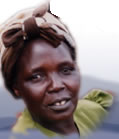 |
 |
||
 |
|||
|
RELATED THEMES education family life gender identity social change spiritual beliefs OTHER LOCAL THEMES BACKGROUND |
culture and customs
The most widespread argument for circumcision is that it is a necessary ritual for transition into adulthood, through which young people learn of their forthcoming roles and responsibilities. Only a few give other explanations, ranging from the belief "that if one wasn't circumcised, he or she will not bear children", to circumcision among women being necessary as a means of "eradicating [female desire and therefore] prostitution". It seems that many women are now refusing to be circumcised, although by doing so they risk the wrath of the community. One man tells how, although he wished not to circumcise his children, he could not resist community pressure to do so, and so lost his place on the Church council. Possibly because of the growing opposition to circumcision, emotions around the issue have been heightened and a few narrators recount recent stories of people, young and older, being taken away to be circumcised against their will. Despite these tensions, it remains an important milestone for many young people, who actively seek circumcision because they want to become adults, and be accepted by the community. As one narrator says, "A person who is circumcised is highly respected and seen as an old person even if he or she is your age mate. The uncircumcised is still seen as a child" (Kenya 2) . Circumcision usually takes place in the early teens, in the school holidays. Particular songs and dances are associated with the ceremony, as well as traditional beer brewing, and it was considered the most important communal gathering. Because of the wider ritual and social significance of circumcision, hospital operations were frowned upon. Now, however, less money is being spent on the ceremony, because of the extra expense of school fees, and hospital circumcisions are more acceptable. For many narrators, the wider ceremonial significance of circumcision, as well as its educational role, means that its decline in importance is directly linked to the threat to traditional Sabaot culture. One narrator mourns the loss of traditional songs: "[modern music] eclipses and overshadows our aesthetic and cultural beauty. We now forget that we have our own songs and are not singing what is rooted in our culture.... the songs we used to have, informed, educated and told us about our roots" (Kenya 12) . Those wanting to maintain the Sabaot cultural tradition face difficulties. One narrator points out that anyone wanting to hold a music festival, for example, must register it in Nairobi, but those who have always lived in rural areas would find the journey and the city expensive and intimidating, "which is another way of killing [the festival]"(Kenya 22) . Another narrator feels that intermarriage with other groups has meant "there is no time to speak the Sabaot language", and he considers that maybe "if there was a book for Sabaot to be used in schools..., some cultural values will be maintained" (Kenya 22) . quotes about culture and customs"I think that we must re-educate our people and tell them in no uncertain terms that our culture is just as good. Let us not believe in the propaganda, from other quarters, that we have nothing to offer the world, that we are people without a history, that we are people without a culture." "In the olden days, there were so many more activities: singing, telling stories by the grandmothers in their homes. From them they were taught songs that contained meaning. Not just these songs, but there were some songs that were sung when the teenagers used to organise themselves and maybe sang outside to entertain the old." "You know, sometimes the girl has been schooling far away, and she has not time to talk with her mother or grandmother. So during circumcision, we advise her on how it will be necessary to behave and show her how to respect her future husband" "We've been circumcising both girls and boys from the beginning. A girl would not be married before she was circumcised. Circumcision for the boys was meant to enhance cleanliness and to inculcate bravery into a boy that was to grow into a warrior. But for the girls, circumcision was aimed at eradicating prostitution.. This is a tradition that has served us well from the beginning and I see no reason why it should be wiped away. " "When you are not circumcised, you look like a goat among the sheep." "In the past, [the seclusion period] was the time to learn what a man/woman should know. According to the traditions, boys are taught [how] to behave when they are married. Girls are taught in seclusion how they will cook, how to behave as a mother, how to feed their husbands and children and how to relate to their neighbours. This period is mainly for educating on how to live and feed the children. One is taught to leave childish behaviour and adopt adult behaviour." "There was another man who was against them circumcising his own wife and was beaten badly until he was admitted in the hospital, while the wife proceeded to the operation that very day.Circumcision is one of our traditions and we have to practice and sustain it. The practice has been taken as a must and whenever one does it the other candidates will start longing for it until they are operated on." |
|
 Concern with the circumcision ritual, and its wider meaning, is a major theme of the testimonies, and attitudes towards it vary. Many Sabaot see it as central to their culture and defend it fiercely against opposition from the Church, health organisations and some individuals in the community. Indeed, the Bukusu, and the Teso who emigrated to Mount Elgon, say that they now practice male circumcision due to Sabaot influence. Several narrators, however, say they have not circumcised their children because its importance has declined. And attitudes to female circumcision - the practice that has been subject to most external opposition - are particularly ambiguous, with several women speaking out against it.
Concern with the circumcision ritual, and its wider meaning, is a major theme of the testimonies, and attitudes towards it vary. Many Sabaot see it as central to their culture and defend it fiercely against opposition from the Church, health organisations and some individuals in the community. Indeed, the Bukusu, and the Teso who emigrated to Mount Elgon, say that they now practice male circumcision due to Sabaot influence. Several narrators, however, say they have not circumcised their children because its importance has declined. And attitudes to female circumcision - the practice that has been subject to most external opposition - are particularly ambiguous, with several women speaking out against it.